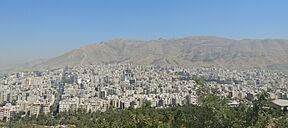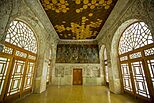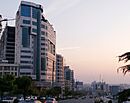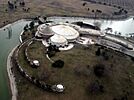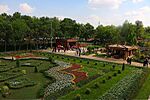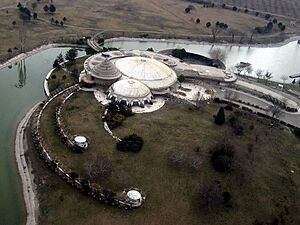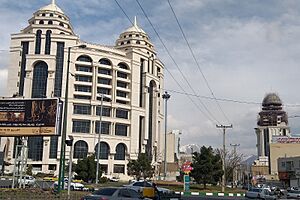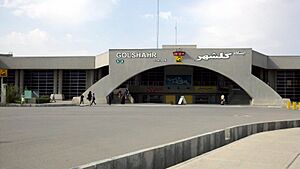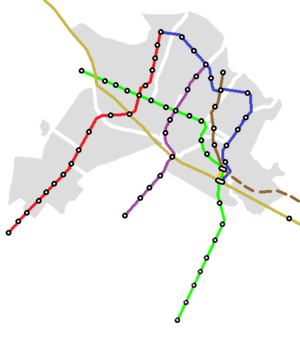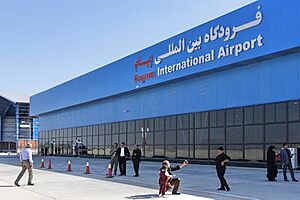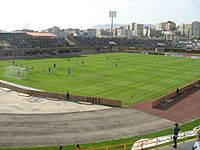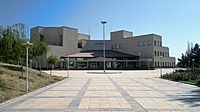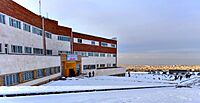Karaj facts for kids
Quick facts for kids
Karaj
کرج
|
||
|---|---|---|
|
City
|
||
|
Panoramic, Soleymaniyeh Palace, Taleghani Boulevard, Pearl Palace, Tulips Festival, Amir Kabir dam lake, Zana Aderan Village
|
||
|
||
| Country | Iran | |
| Province | Alborz | |
| County | Karaj | |
| District | Central | |
| Area | ||
| • City | 162 km2 (63 sq mi) | |
| Elevation | 1,312 m (4,304 ft) | |
| Population
(2016)
|
||
| • City | 1,592,492 | |
| • Density | 9,830/km2 (25,460/sq mi) | |
| • Urban | 1,973,470 | |
| • Metro | 2,512,737 | |
| • Population Rank in Iran | 4th | |
| Time zone | UTC+3:30 (IRST) | |
| Area code(s) | 026 | |
| Climate | BSk | |
| Website | karaj.ir | |
Karaj (Persian: کرج) is a big city in Iran. It is the capital of Alborz province. Karaj is known for its beautiful nature, with many trees, rivers, and green areas. This gives the city a special climate.
Karaj has been around for a very long time. The first records of the city go back to 3000 BC. It grew a lot during the Safavid and Qajar empires. Today, Karaj is the fourth-largest city in Iran. It is also a popular place for people to move to. Because of this, it is sometimes called "Little Iran."
Contents
History of Karaj
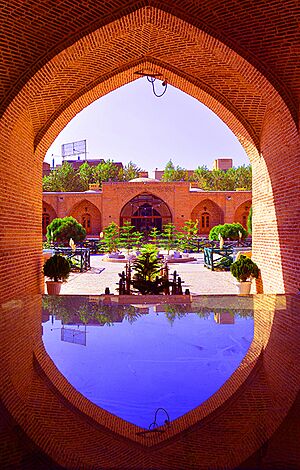
The area around Karaj has been home to people for thousands of years. Old sites from the Bronze Age and Iron Age show this. But the Karaj we see today mostly grew in the 1900s. This was due to new factories and industries.
Karaj was an important stop on the road between Tehran and Qazvin. During the Safavid era, a stone bridge was built. This bridge was the main way to cross into the town. The large Shah-Abbasi Caravansarai was also built around this time. It was a resting place for travelers.
In 1810, a Qajar prince built the Soleymaniyeh Palace in Karaj. It was meant to be a summer home. The palace had four towers and was surrounded by gardens. Later, a School of Farming was started at this site. It eventually became part of the University of Tehran.
In the 1930s, there were plans for a huge industrial area in Karaj. This "Industrial Model Town" was supposed to have Iran's first steel mills. However, World War II stopped these plans.
A big private industrial area was built in the 1960s. It was called Shahrak-e Jahanshahr. This complex had factories for oil, tea, and textiles. It also had homes for the workers.
The Morvārid Palace was built nearby during the Pahlavi era. It was designed by famous architects. Today, parts of it are open to the public.
Other old places in Karaj include the Mausoleum of Šāhzāde Soleymān and several Emāmzāde shrines.
People of Karaj
Ethnic Groups
| Ethnic groups of Karaj | ||||
|---|---|---|---|---|
| Ethnic groups | Percent | |||
| Persians | 53% | |||
| Azerbaijanis | 30% | |||
| Kurds | 7.2% | |||
| Gilak and Tabari | 5% | |||
| Lurs | 4.1% | |||
Most people in Karaj are Persians. The second largest group is Azerbaijanis. Other groups living in Karaj include Kurds, Gilak, Tabari, and Lurs.
Population Growth
Karaj has grown a lot over the years. In 2006, about 1.3 million people lived in the city. By 2016, the population had grown to nearly 1.6 million people.
Geography and Climate
The main part of Karaj is near the Karaj River. It is also close to the old Karaj Bridge. Some well-known areas in northern Karaj include Hesārak and Gowhar Dašt. Meškin Dašt is a large farming area near the city.
Karaj has many parks and green spaces for fun. These include Irānzamin Park, Tennis Park, and the Tulip Garden of Gačsār.
Weather in Karaj
The weather in Karaj is a bit cooler than in Tehran. It gets about 250 millimeters of rain each year. The climate is known as a cold semi-arid climate. This means it's usually dry, but not extremely hot.
| Climate data for Karaj (1985–2010) | |||||||||||||
|---|---|---|---|---|---|---|---|---|---|---|---|---|---|
| Month | Jan | Feb | Mar | Apr | May | Jun | Jul | Aug | Sep | Oct | Nov | Dec | Year |
| Record high °C (°F) | 18.2 (64.8) |
19.8 (67.6) |
27.4 (81.3) |
33.0 (91.4) |
34.6 (94.3) |
39.2 (102.6) |
42.0 (107.6) |
40.2 (104.4) |
37.2 (99.0) |
31.8 (89.2) |
25.0 (77.0) |
20.0 (68.0) |
42.0 (107.6) |
| Mean daily maximum °C (°F) | 6.1 (43.0) |
9.0 (48.2) |
14.2 (57.6) |
20.7 (69.3) |
26.2 (79.2) |
32.6 (90.7) |
35.2 (95.4) |
34.5 (94.1) |
30.4 (86.7) |
23.5 (74.3) |
15.1 (59.2) |
8.9 (48.0) |
21.4 (70.5) |
| Daily mean °C (°F) | 1.8 (35.2) |
4.1 (39.4) |
8.7 (47.7) |
14.5 (58.1) |
19.2 (66.6) |
24.6 (76.3) |
27.1 (80.8) |
26.8 (80.2) |
22.9 (73.2) |
17.1 (62.8) |
9.9 (49.8) |
4.6 (40.3) |
15.1 (59.2) |
| Mean daily minimum °C (°F) | −2.5 (27.5) |
−0.7 (30.7) |
3.2 (37.8) |
8.4 (47.1) |
12.2 (54.0) |
16.5 (61.7) |
19.0 (66.2) |
19.1 (66.4) |
15.3 (59.5) |
10.8 (51.4) |
4.8 (40.6) |
0.3 (32.5) |
8.9 (48.0) |
| Record low °C (°F) | −19.0 (−2.2) |
−15.6 (3.9) |
−10.5 (13.1) |
−3.5 (25.7) |
−0.4 (31.3) |
7.2 (45.0) |
10.6 (51.1) |
12.0 (53.6) |
7.0 (44.6) |
−0.5 (31.1) |
−6.0 (21.2) |
−14.6 (5.7) |
−19.0 (−2.2) |
| Average precipitation mm (inches) | 30.8 (1.21) |
32.1 (1.26) |
45.4 (1.79) |
39.1 (1.54) |
19.5 (0.77) |
2.7 (0.11) |
3.0 (0.12) |
1.2 (0.05) |
1.6 (0.06) |
15.1 (0.59) |
27.7 (1.09) |
33.5 (1.32) |
251.7 (9.91) |
| Average precipitation days (≥ 1.0 mm) | 6.3 | 5.7 | 6.7 | 5.8 | 3.7 | 1.0 | 0.7 | 0.3 | 0.3 | 3.2 | 4.8 | 5.8 | 44.3 |
| Average snowy days | 5.4 | 3.7 | 1.9 | 0.1 | 0.0 | 0.0 | 0.0 | 0.0 | 0.0 | 0.0 | 0.5 | 2.7 | 14.3 |
| Average relative humidity (%) | 67 | 60 | 53 | 48 | 43 | 34 | 35 | 34 | 36 | 44 | 56 | 66 | 48 |
| Mean monthly sunshine hours | 166.3 | 169.7 | 197.4 | 218.1 | 280.7 | 335.2 | 341.5 | 340.1 | 304.2 | 250.1 | 187.2 | 156.8 | 2,947.3 |
| Source: Iran Meteorological Organization (records), (temperatures), (precipitation), (humidity), (days with precipitation and snow), (sunshine) | |||||||||||||
The Amir Kabir Dam and other small lakes are in Karaj. The city is also a starting point for a scenic drive. This road goes north through the Alborz mountains to the Caspian Sea.
Economy and Industry
Karaj's economy is strong because it is close to Tehran. Many goods are transported between Tehran and the Caspian Sea through Karaj. The city also produces chemicals, fertilizers, and processed farm goods.
An important industrial area is Zowb Āhan. This area was planned to be a steel mill long ago. While the original plan didn't happen, Karaj became a major industrial center.
Shahrak-e Jahanshahr was the first modern private industrial complex. It was built in the 1960s. Factories there made textiles, oil, and tea. Today, Karaj is one of the biggest industrial zones in Iran. It contributes a lot to the country's economy.
The Payam special economic zone is also in Karaj. It is located near Payam International Airport. This zone helps with air cargo, postal services, and cold storage. It is important for sending fresh goods out of the country.
Clothing Production
Karaj has many small and medium companies that make women's clothing. They produce everyday clothes and leather boots. Karaj is known for making over-the-knee boots. These boots are sold all over Iran and help the city's economy.
Getting Around Karaj
Karaj is well-connected by roads and railways. It has highways to Tehran and Qazvin. There is also a commuter rail that connects to Tehran's subway system.
Metro System
Karaj has its own metro system. It has two lines and ten stations. Line One goes from west to east through the city. It also connects to Line Five of the Tehran Metro. This line stops at places like Chitgar park and Azadi stadium in Tehran.
The second metro line in Karaj is still being built. It will run from north to south. A limited service for this line started in February 2023.
| Line | Line Route | Length | Stations |
|---|---|---|---|
| 1 | Germdareh – new city of Mehestan | 43 km (26.7 mi) | 7 |
| 2 | Kamalshahr–Mallard | 27 km (16 mi) | 23 |
| 3 | Karaj–Azimiyeh | 14 km (9 mi) | 12 |
| 4 | Baghestan – Karaj (Payam) Airport | 18 km (11.1 mi) | 19 |
| 5 | Shahid Moazen Boulevard – Mohamadshahr | 12 km (7.5 mi) | 10 |
| 6 | Esteghlal Boulevard – Shahid Soltani Square | 9 km (6 mi) | 8 |
| Total: | 97 km (60 mi) | 76 | |
Roads and Highways
Karaj has a good highway system. The Tehran–Karaj Highway is one of the busiest roads in Iran. It connects Karaj to Tehran. The city also has the Karaj Special Road and the old Fath Highway.
[[wide image|Karaj Chalus Road Cross the River LD - panoramio.jpg|880px|A view of the Karaj-Chalous Road (Road 59) and the Karaj River]]
Bus System
Karaj has a large bus system. There are about 1,600 buses that serve the city and its nearby areas. More than 80 bus lines help people get around. Getting an Alborz Card can make bus travel cheaper.
Air Travel
Karaj has its own airport, Payam International Airport. It opened in 1997. This airport is used for cargo, commercial flights, and mail. It is important for the country's communication and technology industries.
Sports in Karaj
Karaj is home to many sports activities. The city used to have a professional football club called Saipa. This team even won a championship while based in Karaj. Now, the main professional football team is Oxin Alborz. They play at the Enghelab Stadium, which can hold 15,000 people. This stadium has hosted international football matches.
The Saipa volleyball team has also done well. They have been runners-up in Iran's Super League seven times.
Karaj is close to the Dizin ski resort. This is one of Iran's international ski resorts. Besides skiing, Dizin offers tennis courts, a grass skiing slope, and places for mountain climbing. You can also go walking, riding, and cycling there.
Karaj also has an international tennis complex. It is called Jahanshahr International Tennis Complex. This park has eight practice courts and one main court for competitions. It is the only tennis complex in Iran with covered courts.
Education and Research
Karaj has many important schools and research centers. These include:
- University of Tehran (Agriculture and Natural Resources College)
- Kharazmi University (Karaj Campus)
- Tehran University of Art (Karaj Campus)
- Payame Noor University (Karaj Center)
- Alborz University of Medical Sciences
- Islamic Azad University, Karaj Branch
- Razi Vaccine and Serum Research Institute (This institute works on vaccines and serums.)
- Materials and Energy Research Center
- Standard Research Institute
Famous People from Karaj
Many talented people come from Karaj.
Scholars
- Saied Reza Ameli (born 1961), a communication scholar.
- Abū Bakr Muḥammad ibn al Ḥasan al-Karajī (around 953 – 1029), a Persian mathematician and engineer. He wrote important books on math.
Actors
- Mehran Rajabi (born 1962), an actor.
- Mehraneh Mahin Torabi (born 1957), an actress.
Writers
- Hossein Sanapour (born 1960), a writer.
- Saeed Kamali Dehghan (born 1985), a journalist.
Athletes
- Ali Kiaei (born 1987), a futsal player.
- Milad Farahani (born 1988), a football player.
- Alireza Heidari (born 1976), an Olympic wrestler.
- Mehdi Mahdavi (born 1984), a volleyball player.
- Leila Esfandyari (1970–2011), a mountain climber.
- Mohammad Nosrati (born 1981), a football player.
- Behnaz Shafiei (born 1989), a racing driver and motorcycle racer.
Images for kids
See also
 In Spanish: Karaj para niños
In Spanish: Karaj para niños
 | Bessie Coleman |
 | Spann Watson |
 | Jill E. Brown |
 | Sherman W. White |


